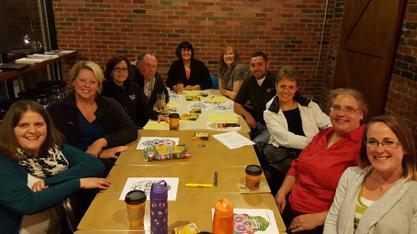Bodies: What happens after we die?
A write up of Des Moines Death Cafe

We had another GREAT Death Cafe last month! It was a cold, rainy night, which contributed to this being our smallest Death Cafe yet, with 3 facilitators and 8 particpants. However, I would venture to say that the small numbers provided even better conversation, because we all had a chance to speak at length, if we wanted to.
As we've seen before, the conversation developed a few "themes" as people shared their stories and ask questions. Tonight's conversation revolved around the body: what happens after we die (physically), how we prepare bodies, and how we dispose of bodies.
Our conversation was kicked off by a member who has visited the Trappist Monks in Dubuque, IA (about 3 hours from here). The Trappist monks have a self-sustaining forest, from which they make caskets and urns. If you purchase an urn from them, they plant a tree in your Loved One's honor. From there, we discussed green burials and hone funerals, especially getting into who performs the ceremonies and takes care of the paperwork if you choose to have a ceremony at home.
We then discussed how funerals today are similar/different from funerals in the past: who comes, how we dress, traditions, etc. It was great to hear the discussion--sometimes a group member would have answers to a question, other times we just enjoyed speculating about the possibilities. We had a very short discussion about the short-lived tv show "Best Funeral Ever." I suspect this will come up again at our next Death Cafe, after people have had a chance to watch an episode or two.
We started to discuss body decomposition and preparation, which led into a great discussion on taboos against touching a person once s/he has died. One member of our group had never considered the possibility of touching a deceased person until her teenager kissed his father without hesitiation. She said it opened up a whole new world for her to grieve and say goodbye. For others in the group, NOT touching/kissing the deceased was the taboo--some even felt pressure to touch the person. It was interesting to hear people discuss their first experience with death, and to watch them realize how much that had shaped their expectations for what is "right" or "wrong". This was followed by an interesting discussion about other funeral practices we participate in, such as jazz funerals or playing non-death related music instead of the "classics". One participant shared a story of an authority figure in her life telling her how bad it was to play upbeat music, and how that affected her opinion of his position and the rights of a family to make decisions based on the deceased's wishes.
We talked about the importance of having these conversations before they become an emergency--that we need to let people know NOW that they make a difference, before a terminal illness or death robs us of the opportunity.
Some unanswered questions from our Death Cafe:
Who helps sort things out after a death? Especially if a death occured out of state - who takes care of the insurance, finding all the bank accounts/investments, paperwork, etc.
How do we talk to kids with autism about death? Is there a special language we can use to help them understand? Who has this knowledge?
As always, it was a colorful conversation! We are excited to meet again later this month!

